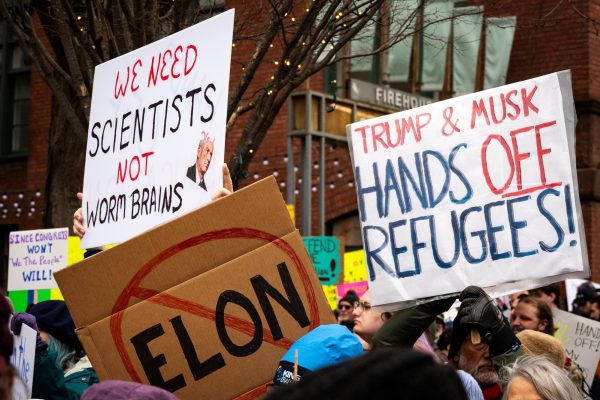Group aims to educate students about source of food
Students in UVM food justice clubs are reconnecting with their food.
The Real Food Revolution is a UVM group dealing with issues facing the Real Food Challenge, as well as educating students on where our food comes from, club leader senior Olivia Percoco said.
The goal of the RFC is to have 20 percent of on-campus food meet the requirements of being local, organic, fair trade or humane by 2020, according to the RFC guidelines.
Food that is purchased goes through a calculator with different criteria to see if the food is “real” based on those criteria, Percoco said.
The RFR is addressing sourcing and distribution issues that have come up in the Real Food Challenge, Percoco said.
About 12 percent of food had met the Real Food standard. However, UVM just lost their dairy category due to Cabot being disqualified for being a concentrated animal feeding operation, Percoco said.
An AFO is an operation that confines animals for at least 45 days in a 12-month period with no vegetation during the normal growing season, according to the EPA.
CAFOs are animal feeding operations that meet certain Environmental Protection Agency criteria, according to the EPA.
The RFR has not yet received a copy of the new contract between UVM and Sodexo which was signed this summer, so the current amount of food meeting the Real Food standard is unknown.
Finding producers that meet the RFC guidelines can be difficult and Percoco said the Real Food Revolution is looking to see if these requirements are limiting in a good way or are too restrictive.
RFR is inviting schools from all over Vermont for a summit to talk about the issues schools are facing with the challenge Oct. 16 to 18.
This is the first time students are coming together from different schools to discuss these issues, Percoco said.
“I think real food challenge national is realizing that and recognizing that their impact would be so much greater if they just connected the regions together,” she said.
“The Real Food Revolution was born out of the identified need for more student voice and a better idea of what students actually want our food system to look like,” Percoco said.
Students brought Vermont maple syrup, locally grown potatoes, and soup made with beats from Digger’s Mirth Collective Farm in Burlington to a potluck hosted by the group Sept. 26.
“The idea is to foster a culture of students who think about the implications of the food that goes into their mouths,” Percoco said.
“It’s so they make good purchasing decisions and use their dollars wisely,” she said. “It’s so they don’t waste so much food, it’s just like the food system in its entirety.”
Slow Food is another club working to provide good, fair, food for all. One of the ways they are doing this is by teaching students how to make meals out of local foods, Slow Food club leader Katherine Hays said.
This semester Slow Food, along with 10 other people, harvested over 8,000 pounds of apples from local farms that would have otherwise been disposed of, she said.
“We don’t know that much about food from our culture because we’ve kind of lost that,”
Hays said. “So I think just getting back to the roots is important.”









